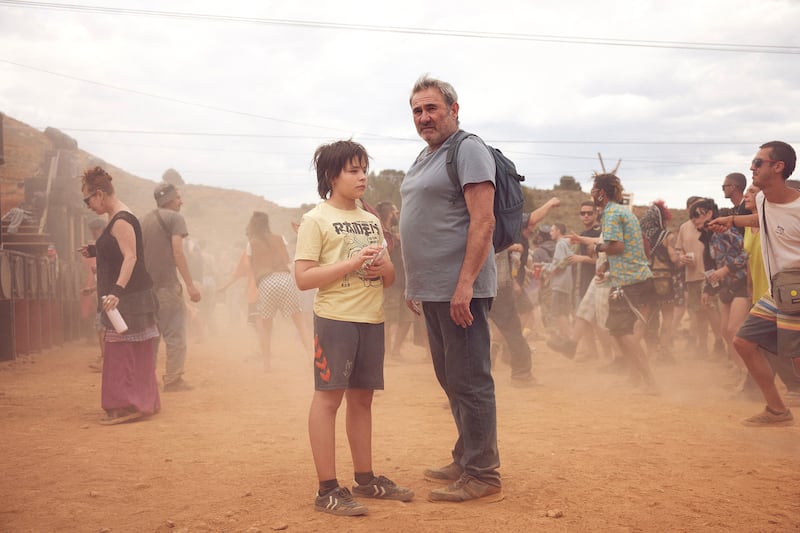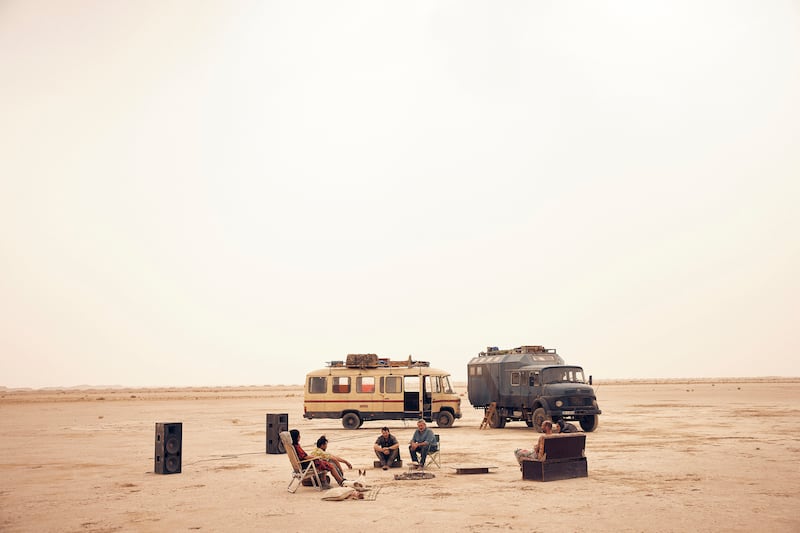A wall of speakers is erected in front of a towering mountain range, producing a vision of dual monoliths that are as imposing, unforgiving, and inhuman as the electronic beats that entrance the men and women dancing before them.
These ravers have come to the Moroccan desert to seek communion, but as they bounce, shimmy, and sway to the rhythmic tunes blaring across this barren land, they appear at once in harmony with each other, their music, and their environment, and strangely isolated, caught up in their own private fugue state. They’re together, and yet alone.
Into these throngs wanders Luis (Sergi López) and his adolescent son Esteban (Bruno Núñez Arjona), handing out fliers in the hopes of finding their adult daughter/sister Marina, who’s been missing for five months and whom they believe might be attending this event.
Sirât is Luis’ story, although the true nature of Galician auteur Óliver Laxe’s feature—which earned the Jury Prize at May’s Cannes Film Festival, and is now screening at the Toronto International Film Festival—is initially difficult to ascertain.

As it ventures into a scorching and explosive heart of darkness, however, this masterful film reveals itself to be both a gasp-inducing thriller and a dense psychological drama about connection and disconnection, accord and disarray. Synthesizing elements of Mad Max, 2001: A Space Odyssey, The Wages of Fear, Twentynine Palms, and Dune (among others), it’s an unforgettable portrait of the search for unity at the edge, and end, of the world.
Despite their best efforts, Luis and Esteban (accompanied by their cute pup Pipa) locate no one who recognizes Marina. They do learn, however, that another rave is taking place somewhere in the south of Morocco. Shortly thereafter, a military caravan arrives to disperse the crowd due to a national emergency, and ensuing radio reports indicate that World War III has broken out.
Still, that noise is so distant as to be virtually unheard by Sirât’s protagonists. On the road back to civilization, Luis spies multiple trucks suddenly breaking free from the pack (and the soldiers ushering it along). With no other shot at finding the forthcoming bash, he follows suit, thereby charting a perilous course for himself and his son into the vast, pitiless middle of nowhere.
Luis isn’t wanted by those he’s pursing; Tonin (Tonin Janvier), Jade (Jade Oukid), Steff (Stefania Gadda), Josh (Joshua Liam Herderson), and Bigui (Richard ‘Bigui’ Bellamy), who are traveling across the arid country in two aged trucks that are far better equipped for the terrain than the desperate father’s vehicle, would prefer no outsider accompaniment.

Nonetheless, Luis refuses to take no for an answer, and as his journey unfolds, he’s slowly accepted by the motley ravers, whose scraggly visages, unkempt clothes, and ramshackle transports make them look like outcasts from George Miller’s Down Under dystopian saga. No matter their exteriors, Tonin and company turn out to be warm and inviting, and the fact that Tonin is missing a leg, and Bigui a hand, suggests that they’re as incomplete as Luis, whose morose and determined expression speaks volumes about his grief and despair.
Laxe (whose prior Fire Will Come also earned the Cannes Jury Prize) immerses Sirât in Kangding Ray’s thudding, hypnotic electronic score, whose low, ominous tones are complemented by sinister, skittering pulsations, and which, by film’s conclusion, is eerily reminiscent of Vangelis’ work on Blade Runner.
Ray’s trancelike soundscape is paired with vistas of colossal ridges, expansive deserts, and endless horizons, all of them cooking under a burning sun, and as the itinerants proceed along their path, an air of danger gradually deepens. At first, it’s as simple as a river crossing that Luis’ car can’t navigate without assistance. Then, it’s Pipa falling mysteriously ill, and another sighting of the military. Once the crew opts for a mountain pass to avoid additional run-ins with the army, peril becomes omnipresent, with unstable roads and treacherous weather conspiring to thwart forward progress.
Far from the madding crowds, Sirât reverberates with apocalyptic dread, its every panorama of the monumental landscape—which dwarfs these disheveled travelers, reducing them to insignificant passersby—resembling a tableau of the After Times, if not Mars.
In this alien milieu, Luis and Estaban seek comfort and aid from their new friends, and for a time, their partnership serves as a promising bulwark against the emotional and primal forces trying to crush them to dust.
Laxe endears us to these disparate individuals, who’ve hitched their wagons together out of a shared desire for completeness, and in the process, he inspires optimism about their chances for success. Thus, it comes as a brutal blow when, at a moment of triumph, tragedy strikes with ruthless abruptness—an incident that’s so shocking, it’s apt to cause viewers to instinctively scream.
Having knocked the wind out of its characters and audience, Sirât advances into direr territory.
To cope with catastrophe, Jade suggests plugging in their speakers, consuming LSD, and becoming one with the music—an activity that resonates as an attempt at both engagement with, and escape from, their grief and terror. Alas, there’s no respite from the mess Luis and his compatriots have made for themselves, nor, apparently, from the doom that awaits.

As López’s face and body language grows more tormented, and he contemplates succumbing to his sorrow, Laxe (working from a script co-written with Santiago Fillol) compounds Luis and everyone else’s misery via additional, agonizing jolts that make the film’s final passages suspenseful to a borderline unbearable degree.
The sources of Sirât’s anxiety and anguish are, in purely narrative terms, easy to pinpoint. Yet the material’s existential dread is so epic as to feel unfathomable. The fear of loss, and loneliness, is pervasive in Laxe’s tale and, concurrently, his frame; collaborating with cinematographer Maura Herce, his visuals have a frightening remoteness and singed beauty that express these nomads’ tortured hearts and minds.
No matter the heat of the Moroccan desert, the world presented by this unnerving film is cold and divided, and determined to thwart any union that might provide shelter from its storms. It’s as bleak as they come—and in a 2025 that feels on the verge of fragmentation, calamity, and collapse, thus proves uncomfortably attuned to our contemporary condition.









